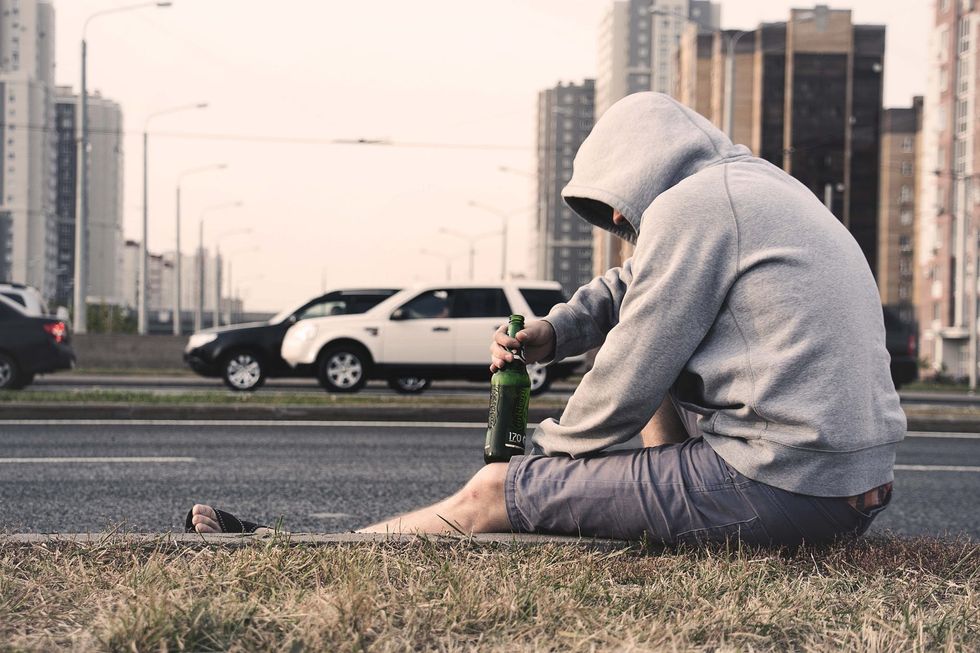My minister, Stephen, differentiates between the phenomena of guilt and shame with this sentiment:
"Guilt is good. It implies that you do bad things, sometimes. Shame is bad. It implies that you are bad."
It's a simple distinction, but one that matters, one with extremely profound implications. Guilt and shame are terms often used interchangeably in therapy and in dictionaries. A lot of the time, the two emotions are even felt interchangeably. But guilt implies that you can come back and repent and seek forgiveness for your actions. Shame implies that you can't be redeemed or saved, and even beyond a spiritual context, shame is much more problematic for any person to feel.
Shame is what tells you you're not good enough when you're taking a risk or trying something new. It is the feeling that you will never amount to anything. In the words of researcher Brene Brown, "shame is a focus on self, guilt is a focus on behavior." Shame is correlated with addiction, depression, violence, aggression, bullying, and suicide, while guilt is inversely correlated with all those things. So while shame leads to destruction, guilt leads to growth.
But I am not one to believe in overarching narratives, because I do believe each person is unique. What works for one person may be different from the other. According to Brown, shame needs three things to grow: secrecy, silence, and judgment. Shame is what tells you that you need to be perfect to be worthy. Guilt is what tells you that you already are worthy, and you just need to do the best you can to be a little better.
Shame is, in Brown's words, a global epidemic. In a religious sense, it tells us that we have to do this, that, and move mountains to even attempt to earn God's love. Living without shame, and only guilt tells us that we don't have to earn God's love - it's something we already have, and we just have to fine-tune the way we live with others and do the best we can. Shame tells you that you need to change everything. Guilt tells you that there are parts of you that are good, parts of you that are bad, but you just need to grow, not change.
In a psychological sense, shame is a relinquishing of control, and the feeling that whatever you do, however hard you try, you can't change things. Although outwardly you're not giving up, inwardly you are, because no matter how well you do, how much you accomplish, how many people you help, shame will always tell you it didn't mean anything and that it didn't matter. Shame tells you that you don't matter. While both guilt and shame are emotions that make you feel bad, guilt motivates you to fix what's wrong, while shame usually leads you to avoid the damage.
I'm writing this article and realizing that it sounds like there seems to be a huge distinction between guilt and shame. There is, and we should strive for guilt rather than shame. But the distinction between feeling the two is not so strong. A lot of us fall on some sort of spectrum - we feel shame about some things, we feel guilty about others. Very few of us lie on either of the extremes.
But Brene Brown says that there are shame-prone individuals and guilt-prone people. Some people say you should surround yourself with more guilt-prone people, but I don't believe in that notion, nor do I believe in categorizing people in my life in that way. "If we're going to find our way back to each other, we have to understand and know empathy, because empathy's the antidote to shame." And Brown believes that being the "man in the arena," per the great Teddy Roosevelt speech, is the way to feel empathy. Because when we step into someone else's chaos and arena, we feel what they feel.
According to Joaquin of the Positive Psychology Program, one way to remedy feelings of guilt and shame is through self-forgiveness. However, "people who are guilt-prone are more likely to self-forgive, while people who are shame-prone are less likely to self-forgive." This is an incredibly important distinction in psychological circles because self-forgiveness is a way to overcome these self-conscious feelings "without ignoring the real damage one may have caused that led to those feelings of guilt and shame."
While shame may be bad and guilt may be good, they are both important social emotions because they stop us from acting in self-interest. Yes, it's harder to act in a more beneficial way when we feel shame instead of guilt, but we all feel both, to some extent, and some of us feel one more than the other. I converted to Christianity this year because Christians I knew treated me with non-judgmental kindness, listened, and extended grace whenever I did wrong, and that's the kind of person I wanted to be to other people.
Joaquin ends his article saying that "guilt and shame are fundamentally meant to lead to a more empathetic and just society." That is something to remember when we are in the arena and think "I've made terrible decisions" or "I'm a terrible person." It's all meant to make us better people in relation to each other.









































